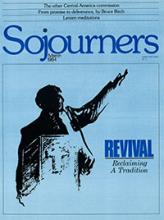Something is stirring in the churches. In every region of the country and from every sector of the church's life, one can feel the change. I believe we may be on the edge of something very significant. Call it renewal, revival, or conversion, but clearly the gospel is coming alive in new and unexpected ways and being radically applied to our historical situation. Indeed, at the heart of the new awakenings and stirrings is the joining of faith and history.
From many divergent traditions and denominations, a new movement is growing that is not afraid to make the meaning of biblical faith specific to our own circumstances, both personal and public. The old divisions within the churches are breaking down—evangelism and social justice, prayer and peacemaking, spirituality and politics, worship and action, pastoral and prophetic ministry, Bible study and political analysis, solitude and community.
We at Sojourners have found ourselves at a blessed intersection of the people, communities, churches, ministries, traditions, and events which, for more than a decade, have been shaping and nurturing this hopeful movement. Our work has been to articulate, preach, and teach this gospel vision and to nurture, support, and help gather together the broadly ecumenical community that it is bringing to life throughout the churches.
The ministry of the magazine has received strong confirmation from a growing readership in the churches. Our hope and expectation is that the impact of its message will both grow deeper and spread wider in the days ahead. The life we share together in Sojourners Community and the roots we have established in one of Washington's poorest inner-city neighborhoods provide for us a solid foundation for the expanding work in the churches around the country and internationally.
Read the Full Article

